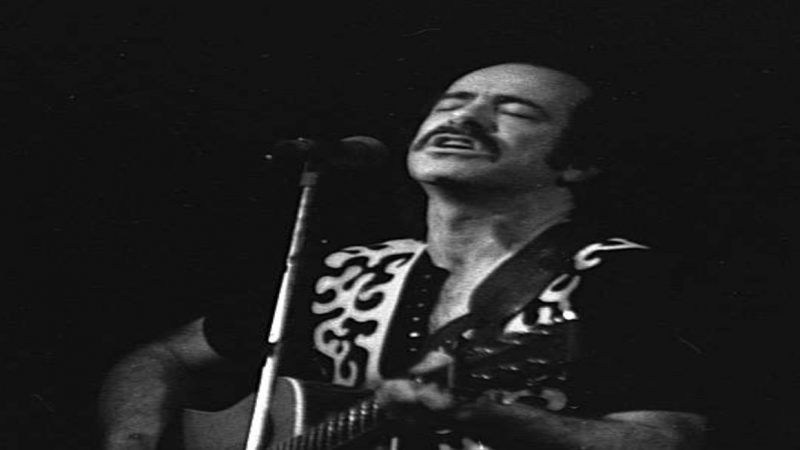Robert Hunter, R.I.P.
The Grateful Dead lyricist filled a generation with a sense of amused, loving, liberatory patriotism.

Robert Hunter, the main lyricist for the Grateful Dead, has died at age 78 of so-far undisclosed causes. Rolling Stone has a decent summation of his life and career.
Hunter's words were unusual and revelatory for "pop music" and formed a folk philosophy for a large generation of Deadheads who didn't merely enjoy the band's music, but made traveling around with them a modern way to emulate America's grand and troubled tradition of traveling frontier seekers, sometimes helping themselves and the places they traveled, sometimes harming them.
But a certain patriotic vision animated it all. As quoted in a book review on a history of the Dead from Reason back in 2003:
Hunter…found distasteful the fealty to Moscow and Peking (as it was called back then) widespread among prominent '60s revolutionaries. That fealty, he thought, was why that aspect of the '60s faded away while the Dead kept on truckin'. "We honor American culture, and what we find good in it," Hunter said of the Dead. And he knew American culture from many perspectives. As a member of the National Guard, Hunter had been called up to keep order during the 1965 Watts riots.
As Jerry Garcia, Hunter's old friend and the man who composed music to and sang his lyrics, added, "Our trip was never to go out and change the world. I mean, what would we change it to? Whatever we did would probably be worse than the way it is now." Why, Garcia asked, "enter this closed society and make an effort to liberalize it when that's never been its function? Why not leave and go somewhere else?" Hunter was able to take a bemused delight in the country that, as he personified it, "shook the hand of P.T. Barnum and Charlie Chan" and that "lived in a silver mine, but called it Beggar's Tomb."
The psychedelic experience that helped launch the Dead as a worldwide phenomenon, was, in an irony Hunter pointed out, pushed along by the U.S. government itself. Hunter once said that the U.S. government "created me…and [Ken] Kesey and the Acid Tests," since Hunter and Kesey were first exposed to powerful psychedelics as volunteers in government military research in the early '60s.
In one of their most iconic songs, Hunter wrote of the mysteriously inspirational "Uncle John's Band" that "their walls are built of cannonballs/their motto is 'don't tread on me.'"
The America summed up by that image—rugged, ornery, jealous of its liberty—shows what made Hunter's songs of enduring interest to those fascinated by the meaning and accomplishments of the American experiment in liberty, in the vices and virtues of an anarchistic American frontier. Despite what the clichéd image of a doped-out Deadhead might suggest, Hunter dealt with vice and dissolution with a reasonably brutal honesty—anything that felt like a joyous celebration of decadence is rare in his writing. "Casey Jones, you better watch your speed."
Hunter's work, unusual for a career writer of popular song, was also not very heavily focused on romantic love, and his most indelible essaying of the topic, "Scarlet Begonias," is mostly about how men should realize that the endless quest for new women to win might not be serving those men well. Rather, by Hunter's constant references to an imagined and mythical old frontier in general, his technique of making modern tall tales and fables out of sometimes warped versions of his, the band's, or his generation's own experiences and attitudes, his lyrics became a genuine continuation of the American folklore he drew on.
The historical streams of pre-existing folklore and musical style that fed into his songs such as "Cumberland Blues," "Casey Jones," "Jack Straw," and "Dire Wolf" reveal Hunter and the Dead's role in the eternal chain of folk music in a modern context. For American kids of the past 50 years for whom talk of "balling the jack" or "a buck dancer's choice" don't mark the music as arisen from their own intimate and folksy experience but as something exotic, strange, alien—Hunter's vivid, complicated, character-filled lyrics sold back to a certain generation of weird Americans a lost and mysterious version of their own country.
His songs will undoubtedly continue to be sung for a long, long time to come, and to impart means of understanding and coping with the exigencies of many of his themes—many uncommon in pop lyrics—of work, responsibility, fate, death, nature, and music itself. Hunter, in combination with his composing partner Garcia and the machinery of touring and recording the band built around their songs, created a semi-coherent artistic universe where the same characters might meet and interact, helping and cheating each other back and forth, a world that's all difficult and ornery frontier as seen with a God's-eye view, of what seems a largely Godless universe. Still, through all the hardships and inescapable sadness and loneliness of many of his songs, a loving tenderness and awe toward the human and cosmic conditions undergirded it all.
That said, Hunter's world was in many respects a place for stoic men to struggle with necessity and destiny and the entrapping bonds of character—a world, as Garcia once described it, "where the laws are falling apart and every person is the sheriff and the outlaw." It's an America that is rough, challenging, but exciting, adventurous, and well worth living in, and Hunter and the band that sang his songs helped make it all those things.
Hunter wrote in one of his most dazzling lyrics, "Terrapin Station," that, "The storyteller makes no choice/Soon you will not hear his voice/His job is to shed light and not to master," a gorgeous and wise summation of his own contributions, and that of the band that sang his songs. We no longer hear his voice. But of course we still do, and always will.
